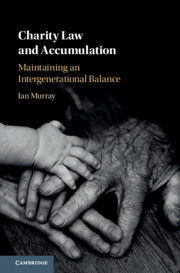Book contents
- Charity Law and Accumulation
- Charity Law and Accumulation
- Copyright page
- Contents
- Acknowledgements
- Table of Cases
- Table of Statutes
- List of Acronyms, Abbreviations and Frequently Cited Works
- Part I Charities and Accumulation Delineated
- Part II Charities and Accumulation Delimited
- Part III Charities and Accumulation Reformed
- 7 Intergenerational Justice and the Intergenerational Distribution of Benefits
- 8 Which Generation Decides the Intergenerational Distribution of Benefits?
- 9 Enhanced Agency Costs
- 10 Conclusion
- Index
8 - Which Generation Decides the Intergenerational Distribution of Benefits?
from Part III - Charities and Accumulation Reformed
Published online by Cambridge University Press: 23 July 2021
- Charity Law and Accumulation
- Charity Law and Accumulation
- Copyright page
- Contents
- Acknowledgements
- Table of Cases
- Table of Statutes
- List of Acronyms, Abbreviations and Frequently Cited Works
- Part I Charities and Accumulation Delineated
- Part II Charities and Accumulation Delimited
- Part III Charities and Accumulation Reformed
- 7 Intergenerational Justice and the Intergenerational Distribution of Benefits
- 8 Which Generation Decides the Intergenerational Distribution of Benefits?
- 9 Enhanced Agency Costs
- 10 Conclusion
- Index
Summary
This chapter explores the issue of how decision-making about the distribution of benefits should itself be distributed across generations. It outlines that under the existing rules, there are gaps in the ability of the present generation to change the rate of accumulation or distribute retained assets, even if they think that to do so would increase public benefit. Thus, the chapter investigates potential normative bases for reforming the decision-making balance between past, present and future decision-makers so as to determine the additional circumstances in which the present generation ought to be able to alter accumulation. It does so by reference to cy-près reform discussions and to principles of intergenerational justice. The chapter then identifies potential ways in which the existing rules might be reformed to better accord with these normative bases, drawing on examples from the United Kingdom and the United States. The potential reforms include broader cy-près and administrative scheme grounds and greater discretion for charity controllers to amend administrative machinery and purposes, but coupled with a period of protection for donor intent.
Keywords
- Type
- Chapter
- Information
- Charity Law and AccumulationMaintaining an Intergenerational Balance, pp. 225 - 256Publisher: Cambridge University PressPrint publication year: 2021



